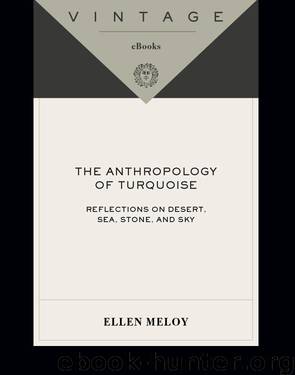The Anthropology of Turquoise by Ellen Meloy

Author:Ellen Meloy [Meloy, Ellen]
Language: eng
Format: epub, mobi
ISBN: 978-0-307-48153-5
Publisher: Knopf Doubleday Publishing Group
Published: 2002-04-12T16:00:00+00:00
ONLY A FEW GENERATIONS AGO, social mores, not women, kept women inside. The clothes didn't help much either—girdles, psychotic footwear, personal responsibility for the breakdown of western civilization if you bared your knee. Far too many women must have simply been too exhausted to break the trance of life inside four walls. For them “nature” was the flooding river that destroyed the crops, the drift of red sand that choked their doorsills and sifted into food and bedding, or the wind that blew the dirt off their family graves, simple graves which they had adorned with wreaths of silvery buffaloberry and sad wild peas.
Fueled by their faith, the pioneer women who, at the turn of the century, settled the difficult, marginal canyon country in the vicinity of my roof, denied their “selfish human cravings” and struggled to live up to their divine purpose: reproduction. Nurses and midwives taught them to keep themselves healthy for ten or more years of childbearing, to avoid the poison to their fertility that came from a husband who smoked, and to avert the “precocious menstruation” that could be induced by indolence, luxury, acting on the stage, naughty thoughts, hot rooms, and “novel-reading.” Outsiders often noted the courage and loneliness of these settlers. Shortly before World War I an Indian trader and his wife passed through the tiny frontier towns of southern Utah on their way to their trading post in Arizona. The wife later wrote: “I shut my eyes and see the faces of the women we met. They were tired always, but determined, and had a look that made me think they were more isolated by something inside them than by geographical conditions.”
In the real world, women—hundreds of women—worked alongside men on an often harsh western frontier. In the myth they were invisible. As long as society saw wilderness as an object of conquest or a place for defining virility and unleashing aggressive impulses, women had few roles in it. A woman's perceived biological shortcomings, her “natural inability” in the masculine domain, kept her at home with the children and the laundry. By the late nineteenth century the nature archetype shifted. What was once hell then became Eden, wilderness a spiritually uplifting rather than forbidding place. No one responded to “scenery” quite like the Victorian tourist, and women joined men in its appreciation.
The feminist movement of the 1970s deconstructed the wimp myth, exposing “natural inability” for what it truly was: inexperience and lack of choices. In some arenas experience came with out stone-cast gender roles. When I traveled in the Sierra Nevada backcountry years ago, the hiker's world was not, at first, solely a place of men, then, as gender barriers fell, a place where more and more women entered a traditionally male field. Instead, both sexes moved freely in the outdoors. Blisters, busted camp stoves, and gorp-thieving mice practiced no discrimination.
We donned heavy packs and chunky waffle-soled boots and somehow made it up the mountain without a miniespresso maker. We tiptoed through groves of giant sequoias with our heads tilted back to take in trees as tall as God.
Download
This site does not store any files on its server. We only index and link to content provided by other sites. Please contact the content providers to delete copyright contents if any and email us, we'll remove relevant links or contents immediately.
The Lonely City by Olivia Laing(4802)
Animal Frequency by Melissa Alvarez(4473)
All Creatures Great and Small by James Herriot(4322)
Walking by Henry David Thoreau(3962)
Exit West by Mohsin Hamid(3828)
Origin Story: A Big History of Everything by David Christian(3692)
COSMOS by Carl Sagan(3625)
How to Read Water: Clues and Patterns from Puddles to the Sea (Natural Navigation) by Tristan Gooley(3469)
Hedgerow by John Wright(3363)
How to Read Nature by Tristan Gooley(3341)
The Inner Life of Animals by Peter Wohlleben(3319)
How to Do Nothing by Jenny Odell(3302)
Project Animal Farm: An Accidental Journey into the Secret World of Farming and the Truth About Our Food by Sonia Faruqi(3221)
Origin Story by David Christian(3202)
Water by Ian Miller(3188)
A Forest Journey by John Perlin(3077)
The Plant Messiah by Carlos Magdalena(2935)
A Wilder Time by William E. Glassley(2863)
Forests: A Very Short Introduction by Jaboury Ghazoul(2842)
